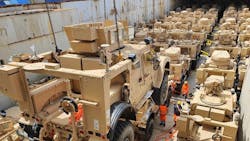Raytheon, Two Six seek to safeguard the military supply chain from accidental or intentional disruptions
ARLINGTON, Va. – U.S. military researchers have awarded two contracts for a project to safeguard the U.S. military supply chain from intentional or accidental interruptions -- particularly for medicines, military metals, and the military food supply.
Officials of the U.S. Defense Advanced Research Projects Agency (DARPA) in Arlington, Va., have awarded contracts to Two Six Technologies in Arlington, Va., and the Raytheon Technologies Corp. BBN segment in Cambridge, Mass., for the Resilient Supply-and-Demand Network (RSDN) program.
RSDN seeks to develop data integration and analytical toolkit for military supply-and-demand networks. The goal is capabilities that are broadly applicable, but the initial focus is on pharmaceuticals, precursor components, and raw materials; -- military metals; and military food, including meals ready-to-eat (MREs).
Two Six Technologies won a $1.9 million RSDN contract on Sunday, and Raytheon BBN won a $7.9 million RSDN contract in April.
The U.S. Department of Defense (DOD) has a critical need to secure its supply chain against intentional and unintentional disruptions, DARPA officials explain. Supply-and-demand networks are open, complex, evolving systems, and reflect external factors like conflict and climate change, as well as dispersed inventory management.
These networks also are subject to imperfect knowledge; difficulty in predicting the results of large space of threats; and difficulty in predicting changes in the supply-and-demand network.
Related: This is not a drill: Preparing for a severe cyber storm
To safeguard the military supply chain from these difficulties, RSDN will develop computer resources and analytical tools like granular up-to-date maps of supply-and-demand networks; detailed organizational features to explore fragilities threats and vulnerabilities in supply-and-demand networks; ways to stress-test supply-and-demand networks through computer simulations.
RSDN is a five-year program in three phases and three technical areas; data curation and reconciliation; augmentation and analysis; and stress-testing. RSDN ultimately should be flexible enough for many uses.
For more information contact Two Six Technologies online at https://twosixtech.com, Raytheon BBN at www.rtx.com/who-we-are/we-are-rtx/transformative-technologies/bbn, or DARPA at www.darpa.mil/program/resilient-supply-and-demand-networks.
About the Author
John Keller
Editor-in-Chief
John Keller is the Editor-in-Chief, Military & Aerospace Electronics Magazine--provides extensive coverage and analysis of enabling electronics and optoelectronic technologies in military, space and commercial aviation applications. John has been a member of the Military & Aerospace Electronics staff since 1989 and chief editor since 1995.
